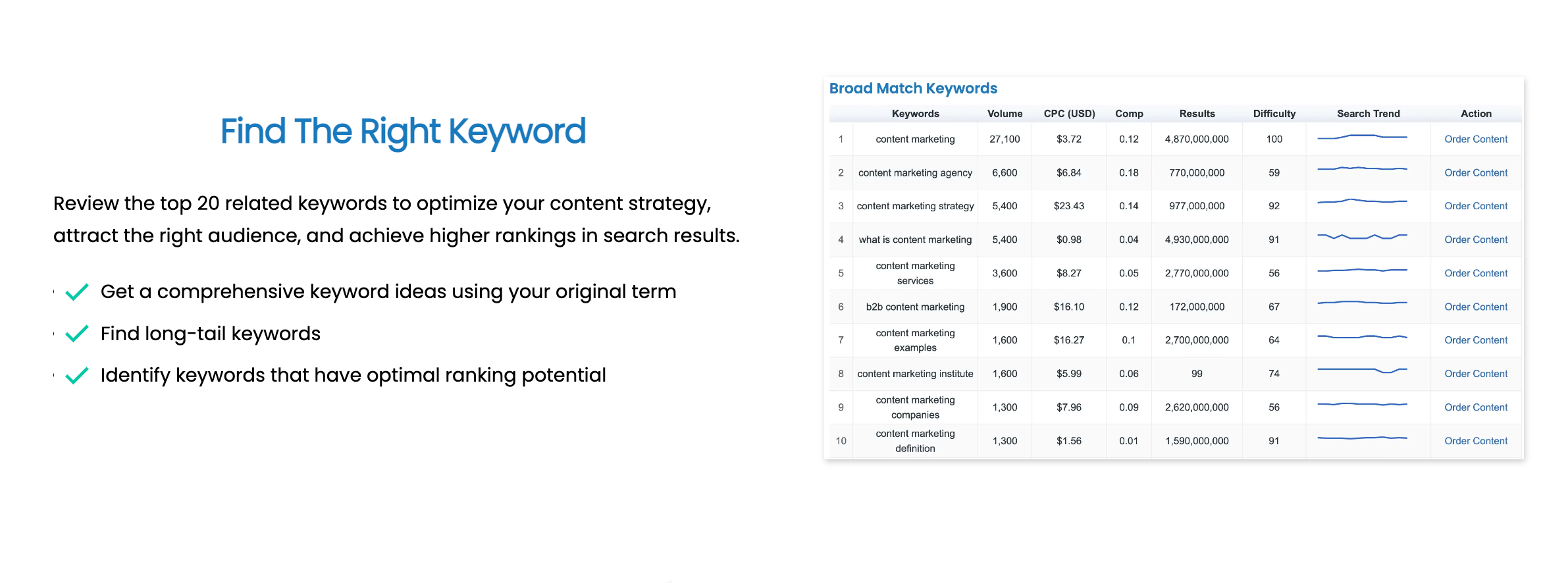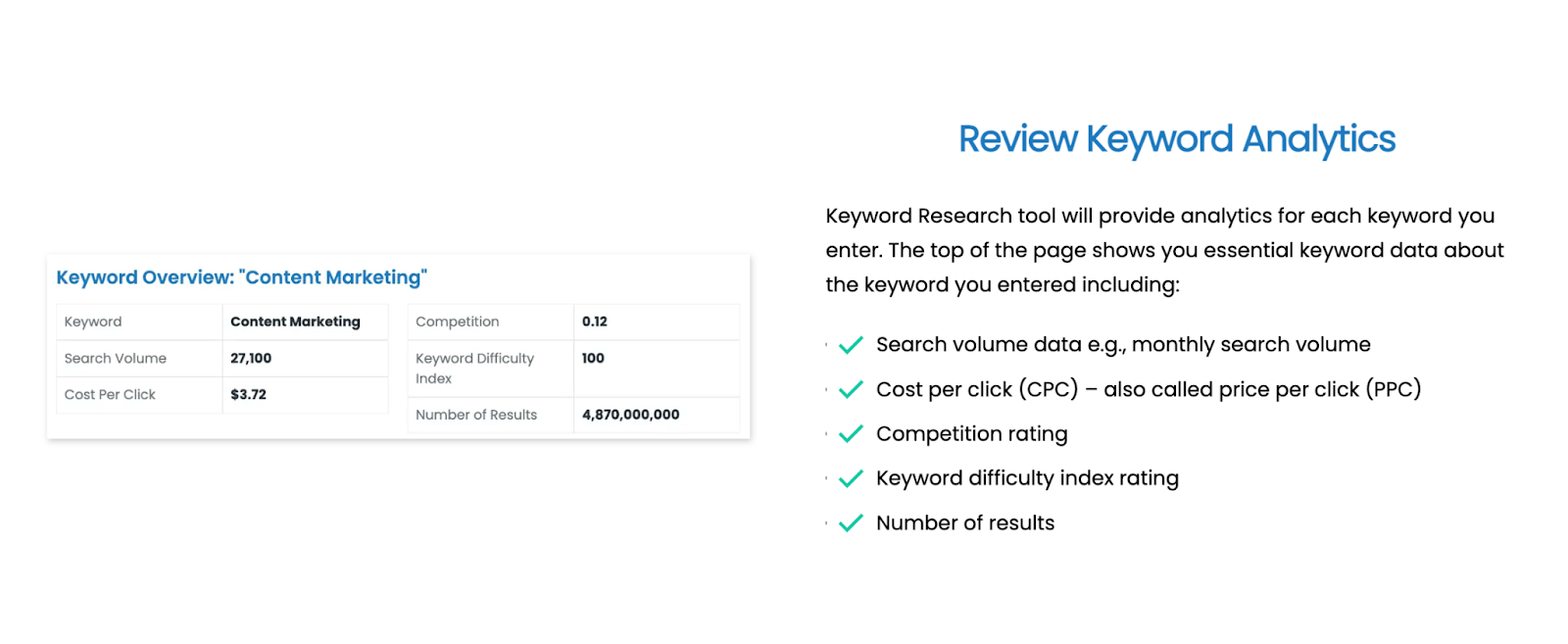- Blog Home
- Krista Hillis
- Keyword Research Tips For Endless Idea Generation
Keyword Research Tips for Endless Idea Generation

Image source: Unsplash/Nisoncoprseo
Keywords are an integral part of any content marketing strategy, as over 53% of all web traffic comes from organic search, and SEO drives 1000%+ more traffic than organic social media. This data shows that keyword research and an optimal SEO strategy are imperative in 2023 and beyond. However, this process can be complex and, for some, overwhelming.
Each day, billions of users rely on Google for search queues, resulting in over 8.5 daily searches — around 99,000 searches a second. Those searching for keywords related to your business are potential customers, so you must nail your keyword research. You'll stay ahead of the competition if you consistently gain insight into these search terms.
While this may sound like a lot of work, requiring specific skills and experience, keyword planning is now much easier than it once was. AI technology can help businesses of all sizes become more efficient. Whether you need support with the strategy, workflow, publishing, or performance phases of content creation, there are tools to optimize and automate each step. For example, you can now identify high-potential keywords in seconds using machine learning. These practical marketing tools can help you save time and money while increasing visibility and ROI.
This guide covers all that and more, helping you implement the right strategies, tools, and mindset to automate this once-time-consuming process.
Keyword Planning: How to Find and Choose the Right Keywords
Keyword planning is the process of figuring out words and phrases that people use in search engines like Google, Bing, and YouTube. The keywords you choose also impact other areas of your digital marketing strategy, including topic generation, website SEO, email marketing, and content promotion.
Keyword research is the first step of any SEO campaign, and it starts by generating a list of keyword ideas.
Keyword Planning Strategies

Keyword success and improved visibility are anything but luck. There are many proven strategies to develop an ongoing list of keyword ideas, and with tools like Scripted's Keyword Research Tool, this process is now more straightforward than ever. In seconds, you can access a list of keywords and associated metrics, allowing you to make data-driven decisions. You can leverage that list to develop new content ideas or fine-tune your pre-existing content strategy.
Once you access this list, the possibilities open up — all while saving crucial resources. So, with that in mind, here are some suggestions to up your keyword planning game, focusing on the process you'll need to take when generating winning content that converts.
Brainstorming Topics
Brainstorming is a way to generate topics that interest your target customer. They're also topics likely to be discussed in sales conversations and used in your marketing materials. In addition, if you have a blog, they're probably the topics you write about most frequently. For example, if you run a wellness company, obvious topics might be things like:
-
Meditation
-
Yoga
-
Healthy Diets
-
Relaxation Techniques
-
Exercise Routines
These topics aren't keywords, but they give you broad topics that you can use to begin your keyword planning. Now, it's time to lean on AI to conduct keyword research. Whether you're running out of creative topics or are unsure how effective your topics will be, you can get a helping hand. Many AI-powered tools are revolutionizing content creation, starting with the initial topic and headline generation phase.
Top tip: Use GPT during the brainstorming process. When given a few seed topics, GPT can generate a variety of additional topics that are related and relevant, diversifying and expanding your topic base.
You can input topics related to your business and use GPT to generate a list of 5-10 related ideas. For example, if you input "meditation" and "yoga," GPT will generate additional topics like "breathwork for stress management," "mindfulness in everyday life," or "the science of yoga for mental health."
This can be achieved when using Scripted's Strategy Chatbot. Writers also have access to the Writer Research Chatbot, which can help guide them when creating creative, expert content.
Read more: How Do I Choose Marketing Software for a Chatbot?
Find Keywords Based on Your Topics
Now that you have a few topics to consider, you can identify keywords under those topic umbrellas. Consider what phrases might be essential to help you rank in search engines. For example, if you wanted to write a yoga-based article and decided on the Top 5 Yoga Poses for Beginners, obvious keywords would be yoga for beginners, yoga poses for beginners, etc.
Use popular keywords and phrases to create a list of specific keywords. However, don't make the mistake of not using the available tools. Once again, GPT will help you generate associated keywords based on your chosen topics, including keywords you may not have considered — or those with a low competitive density.
Based on the topic example, "Yoga for Beginners," GPT may suggest keywords like:
-
Benefits of yoga for beginners
-
Simple yoga poses for beginners
-
Yoga routines for beginner home practice
Popular Phrases
People are predictable. No matter your business model, the same phrase structures or keyword modifiers are common across industries. Here are some keyword modifiers that often drive search volume:
-
where to buy [x]
-
[x] near me
-
the best [x]
-
[x] interview questions
-
[x] checklist
-
[x] tutorial
-
difference between [x] and [y]
-
[x] tips
Although you can create a brief list that's highly specific to your content — for example, "flower shops in New York" or "where to buy furniture in Houston" — there's a more efficient, accurate way to come up with keywords.
Choosing Keywords Based on Metrics

You can choose keywords and phrases based on specific metrics using keyword research tools. This data-driven insight helps you make more informed decisions, supporting a healthier ROI and bottom line. For example, some of the metrics that can help make keyword selection easier include:
-
Search volume data (indicating demand — look at the average monthly searches for the keywords of interest)
-
For pay-per-click ad campaigns (PPC), CPC (cost-per-click showcases price — the higher the CPC, the more advertisers are after that keyword
-
Competition (the difficulty of ranking for that keyword, indicating the difficulty of potentially reaching the first page using that keyword)
-
Word count (e.g., short-tail keywords vs. long-tail keywords)
-
Intent (highlighting user experience, a top Google priority)
Related: Building Authority With SEO Content
Keyword Planning Tactics & Tools
Keyword planning tools can help you come up with more keyword ideas based on the ideas you have. Check out the tools and tactics below to become a keyword idea-generating machine.
Use Google Keyword Planner
-
Research keyword suggestions using your Google Ads account
-
Compare keyword monthly search volume
Check Out Google Trends
-
View historical trends for a keyword
-
Compare similar keywords to see which are more popular
Use SEMrush for Specific Applications
-
Identify the level of competition and see the keywords for which they're ranking in organic search.
-
Research the keywords on which your competitors are bidding in paid search.
Discover more: SEMRush: Reviews, Features, Prices, and Alternatives
Gain Insights With Buzzsumo
-
Explore the content produced about a keyword or topic.
Discover More Using Quora
-
Explore questions that include relevant keywords and create content that answers them.
Lean on Scripted's Strategy Chatbot
-
Whether you're completing keyword planning or benefiting from in-depth analytics, Scripted is an end-to-end solution. Complete each phase without relying on a handful of tools or more. Everything can be completed directly on the platform, providing an efficient, unified experience.
- Scripted's Strategy Chatbot offers personalized content strategies in real time. If you have an idea but are unsure how to proceed or want to see what's trending in your niche, this is the tool for you. Ask a question and get an instant answer, and when you need to discuss something more in-depth, the Scripted team will bridge the gap. Drop us a line anytime.
- You can also use tools like Scripted's Headline Idea Generator or Recommended Content.
Prioritizing Your Keyword Ideas
As discussed, understanding key metrics is important when choosing your keywords. Here are some strategies to ensure your selected keywords will help you improve visibility and boost search traffic.
Understand the Intent
Keyword planning involves curating keywords based on customer intent. This means your web page and content address the problem a user intended to solve by searching a specific term.
For instance, if one of your new keyword ideas is "best yoga positions for back pain," ask yourself what a searcher might intend to find. Are they someone experiencing back pain themselves? Or are they an instructor looking for new positions to introduce in a class?
Depending on who your target audience is, you'll need to make sure of the keyword's intent. The best way to do that is to search the term yourself and see what comes up. Hiring an enterprise writer is an excellent way to ensure you create high-level content that closely relates to the material already ranking for your best keywords.
Understand Google's Algorithms
The most crucial ranking factors in the past were relevance, authority, and volume. These factors are still vital to your success. However, Google's algorithms are constantly changing. As of 2023, there are many signals and factors Google considers, including:
-
The words of your query
-
Quality of content
-
Relevance and usability of pages
-
Expertise of sources
-
Your location and settings
Read more: How Google Does and Doesn't Want You to Use Artificial Intelligence
Use Both Head Terms and Long-Tail Keywords
Head terms are short, generic keyword phrases — usually one to three words in length. Long-tail keywords are longer keyword phrases of three words or more. You should use a mix of head and long-tail terms to round out your keyword planning strategy. It's a good way to improve your ranking based on commonly searched terms and those searched less frequently.
Tools to Help You Prioritize Keywords
-
Moz lets you upload your keyword list to get some metadata, including an organic CTR score for each keyword, which measures how likely you will get traffic from it. You can then export this list and sort it by organic CTR.
-
SEMrush helps you track your position and traffic on the most suitable keywords and industry thought leaders relative to competitors. These benchmarks will give you a clearer picture of what success looks like. Gain instant access to new keywords, related keywords, competition data, etc.
-
Scripted is an end-to-end solution that incorporates the value of AI-powered keyword research tools — plus many other tools that ensure greater productivity and ongoing success. For example, when you're ready to start creating content, Scripted offers SmartMatch technology, matching you with the perfect writer for the job. After all, what good is keyword research if your content falls flat? Proven expertise in this pre-vetted talent pool is just one of the ways you can take your content marketing strategy to the next level. Get AI-powered content with a human touch.
Take the Next Steps - AI, SEO, and Scripted
Many great tools are out there, some offering unique features you may need for specific use cases. You must test out various tools based on your needs and goals.
Regardless of your chosen tool, AI-powered features will help dictate what's next for your SEO strategy. However, that's not the entire story. While AI proves highly efficient and valuable in brainstorming, keyword research, headline generation, and even content generation, content still requires humans to oversee the final product.
To streamline this entire process, it's best to leverage tools to simplify the SEO process, such as keyword planner tools, and then hire an expert human writer to flesh out your ideas or polish a piece of AI-generated content. Whether your content requires the latest research or you seek a specific brand tone, humans fill that gap.
Scripted Can Help
Scripted can take you on a journey from beginning to end. This comprehensive platform will help you optimize the strategy stage, providing AI-powered tools that help you save time, energy, and money. Plus, you can easily generate headlines, ideas, and keywords, creating a brief in seconds. Adjust as you see fit, and then start hiring.
You can also review content directly on the platform and benefit from additional text editing tools, such as Grammarly and AI detection, which are included to ensure high-quality, original content every time.
Ready to take your content creation process to new heights? Get started with Scripted today!
